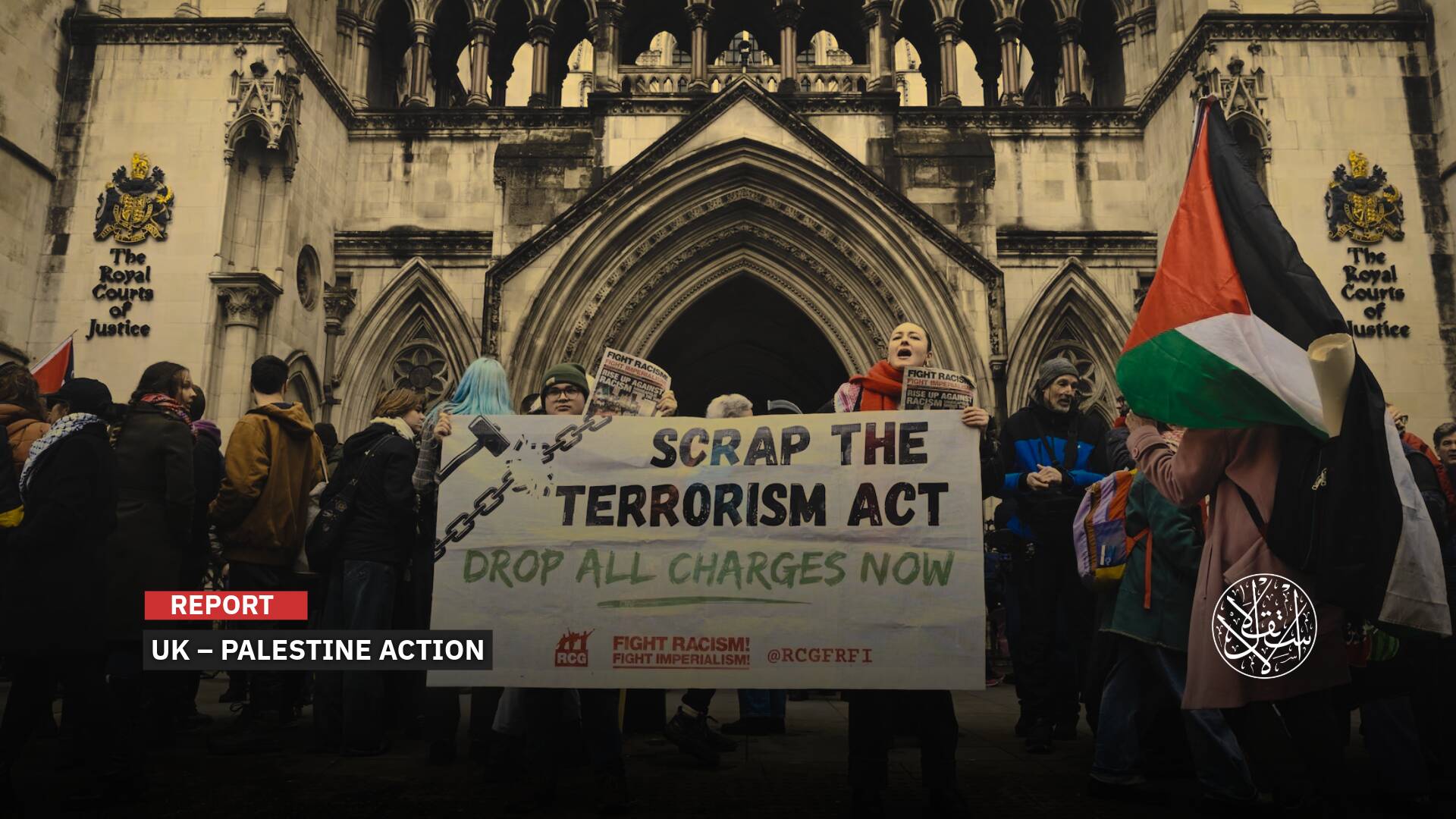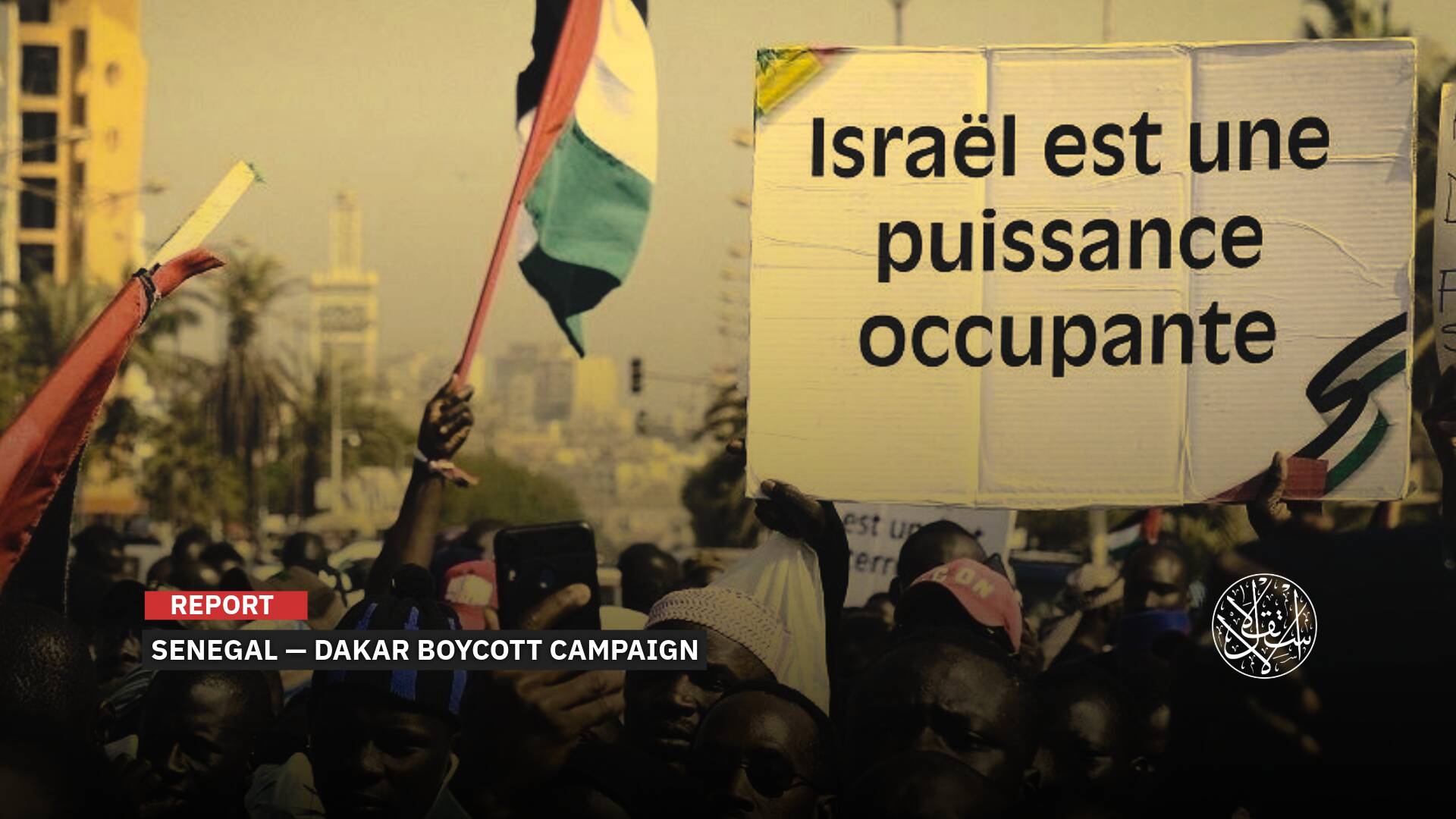As Crimes in Gaza Continue, Military Export Bans Against ‘Israel’ Expand

Sixty-nine percent of Israeli arms purchases come from American companies.
As its devastating aggression on the Gaza Strip continues, increasing pressure on Israeli Occupation’s allies to halt arms supplies has reached a boiling point, causing deep divisions among nations worldwide.
Calls for an arms embargo intensified after the Israeli attack on a World Central Kitchen in central Gaza on April 1, 2024, which resulted in the death of seven aid workers, most of whom were foreign nationals.
Some countries argue that arming “Israel” is necessary to eliminate the Islamic Resistance Movement (Hamas) and prevent a repeat of an event similar to Operation al-Aqsa Flood.
Meanwhile, others fear complicity in the genocide “Israel” has been committing in Gaza since October 7, 2023, by continuing to supply Tel Aviv with weapons.
Expansion of the Embargo
Canada was among the first countries to take a step when the Minister of Foreign Affairs of Canada Mélanie Joly announced on March 20, 2024, a ban on arms sales to “Israel.”
This move came after the Canadian parliament voted 204 to 117 in favor of a non-binding proposal to halt arms sales following a lengthy debate the previous day.
Joly told the local Toronto Star newspaper that the decision was real and that the original proposal was to suspend arms sales, but it was changed to a total ban.
Previously, Canada had imposed a temporary suspension on export permits for military goods and technology to “Israel.”
Joly emphasized that after the parliamentary vote on the arms ban, the government decided to fulfill its commitment.
In this context, Minister of Defense in Canada Bill Blair expressed deep concern to the same newspaper about lethal military sales to “Israel” during the Gaza conflict.
Before that, the Dutch Court of Appeals issued a decision in February 2024 to halt all exports of F-35 spare parts to “Israel” within a week, following a request by human rights organizations. The Dutch government has stated it will appeal against the decision, but no new developments have occurred since.
Italy also stopped sending all types of weapons to “Israel” since October 7, according to the Minister of Foreign Affairs of Italy Antonio Tajani, who also serves as Deputy Prime Minister.
On January 21, 2024, Tajani responded to journalists' questions, "We decided not to send any more weapons to Israel as of October 7, and there is no need to argue about this."
However, the Minister of Defense of Italy Guido Crosetto exempted “previously signed orders,” explaining before parliament on March 14, 2024, that only prior agreements are being executed after inspections to ensure the weapons are not used against civilians in Gaza.
On March 25 of the same year, Israeli official Kan radio confirmed Italy's refusal to sell “Israel” weapons and ammunition used by the Israeli navy.
Spain, one of the most critical European countries of “Israel” during the aggression, did not remain a bystander.
Spanish Minister of Foreign Affairs José Manuel Albares confirmed on February 23, 2024, that his country would not sell weapons to Israel as long as the war on Gaza continued.
He stated during a press conference at the United Nations headquarters in New York that Spain has not granted any new licenses to sell weapons to “Israel” after October 7.

On May 16, 2024, Spain refused to allow a ship carrying weapons bound for “Israel” to dock at the port of Cartagena in the southeast of the country.
The ship, MARIANNE DANICA, was carrying approximately 27 tons of explosive materials and requested permission to stop at the port on May 21, but the request was denied.
However, Spanish media, including elDiario, questioned the credibility of their country's stance, stating that ammunition exports to “Israel” are continuing, based on data published on the official Spanish foreign trade portal, Comex.
Alberto Estevez, a spokesperson for Amnesty International in Spain, stated that the government must completely halt arms exports to “Israel,” demanding that this include licenses authorized by October 7, implying that new shipments are based on pre-existing agreements before this date.
As some countries began taking individual steps in this regard, the UN Human Rights Council adopted a resolution on April 5, 2024, to ban arms exports to Israeli Occupation due to its ongoing aggression in Gaza.
The resolution, adopted by the UN council, called for “Israel” to be held accountable for potential war crimes and crimes against humanity in Gaza, with 28 votes in favor, 6 against, and 13 abstentions.
In addition to the previously mentioned countries, the Netherlands, Japan, and Belgium announced their intention to cease arms shipments to “Israel.”
Among the measures, the Walloon government in Belgium decided in late May to ban the transport of weapons to “Israel” through its airports, responding to requests from NGOs.
In Denmark, a pending court case could force the government to suspend the export of F-35 fighter jet parts to the United States, as the U.S. sells the final aircraft to “Israel.”
In another significant blow, France requested “Israel” in early June 2024 to withdraw its participation in the Eurosatory defense arms exhibition scheduled to take place in Paris from June 17 to 21.
Israeli Public Broadcasting Corporation, Kan, reported that Israeli and French sources confirmed the cancellation, though no official notification has yet been received.
The French Ministry of Defense told Reuters that the conditions for hosting Israeli companies at the exhibition have not been met, while President Emmanuel Macron calls on “Israel” to halt its operations in Rafah, in the far south of the Gaza Strip.
Against the Ban
When discussing countries supporting “Israel” and opposing the arms ban, the United States and Germany, and to a lesser extent the United Kingdom, are at the forefront.
Washington and Berlin were among the countries that opposed the recent Human Rights Council resolution, alongside Paraguay, Malawi, Bulgaria, and Argentina.
The United States, Israeli traditional and strategic ally, consistently supports its aggression without limits in international forums, while Germany stated it opposed the recent resolution because it did not explicitly condemn Hamas.
The U.S. provides an estimated 68% of Israeli total foreign arms imports, according to a report by The Guardian on April 9, 2024.
According to the Stockholm International Peace Research Institute, the U.S. accounted for 69% of Tel Aviv's arms imports between 2019 and 2023.
The U.S. provides “Israel” with $3.8 billion in annual military aid under a 10-year agreement to maintain what it calls "qualitative military edge" over neighboring countries.
This amount has remained stable over the past decade, in contrast to fluctuating aid levels to other allies, according to The Guardian.
The report noted that “Israel” is the largest recipient of U.S. financial aid allocated to a foreign country since World War II, having received a cumulative total of $158 billion by 2023.

In 2016, the two sides signed their third Memorandum of Understanding on military aid, spanning ten years.
This agreement committed the U.S. to provide $38 billion in aid until 2028, including $33 billion in Foreign Military Financing grants and an additional $5 billion for missile defense.
Following Operation al-Aqsa Flood, the U.S. Senate approved a bill in February 2024 to allocate $14.1 billion in additional spending related to “Israel.”
The package includes $4 billion for missile defense systems, $1.2 billion for the Pentagon’s laser defense system, $3.5 billion in Foreign Military Financing, and $801.4 million for ammunition purchases.
Germany ranks second, exporting about 30% of its total arms to “Israel” and serving as a significant supplier.
In 2023, European arms sales to “Israel” reached €326.5 million, a tenfold increase compared to 2022, with most export licenses granted after the October 7 attacks, according to the BBC in mid-April 2024.
The German government stated in January 2024 that the sales included €306.4 million worth of military equipment and €20.1 million in war weapons.
Beyond the U.S. and Germany, other involved countries are the UK and Australia, though Australian Minister of Foreign Affairs Penny Wong stated that her country has not provided weapons since the conflict began in Gaza.
Compared to the U.S., the UK is a much smaller arms supplier, with the total value of its exports to “Israel” unclear, according to The Guardian.
In 2022, the UK government granted arms export licenses worth £42 million but also issued 10 "open" licenses of unlimited value, without publishing the actual export values.
In the UK, over 600 lawyers, academics, and retired judges wrote that continuing supplies violate international law.
However, Foreign Secretary David Cameron stated on April 9, 2024, that the UK would not suspend arms exports to “Israel.”
On May 12, 2024, he reiterated in a Sky News interview that imposing an arms embargo on “Israel” would not be wise.
He said if he announces a ban, it might help him in this interview, but practically it would strengthen Hamas, weaken “Israel,” and reduce the chances of reaching a hostage deal.
Cameron warned that a major operation in Rafah would be very dangerous, but emphasized that making a political statement (referring to the U.S. President's comments about suspending a heavy shell shipment to Tel Aviv) is not the right response. "We need to ensure we act in accordance with the law.”
President Joe Biden had cautioned against “Israel” launching a large-scale ground operation in Rafah during an interview with CNN. He said civilians in Gaza have been killed because of these bombs.
Israeli Concerns
U.S. aid has enabled “Israel” to develop its own arms industry, making it one of the world’s largest arms exporters.
With U.S. support, “Israel” has built its defense industry, now ranking ninth among the world's largest arms exporters, focusing on advanced technological products rather than large-scale war equipment.
Tel Aviv accounted for 2.3% of global sales between 2019 and 2023, according to the Stockholm International Peace Research Institute.
In 2019, the U.S. military purchased $1.5 billion worth of Israeli-made military equipment.
Israeli companies have opened U.S. branches, leading to the manufacture of weapons systems initially developed in “Israel” on American soil.
The Guardian noted that the increasing presence of Israeli arms manufacturers in the U.S. has boosted partnerships between Israeli and American defense companies.
At times, Israeli companies have struck military deals with their government, funded by U.S. military aid.
Despite being a major arms exporter, the Israeli military relies heavily on imported aircraft, guided bombs, and missiles during what experts describe as one of the most intense and destructive air campaigns in modern history, according to the previously mentioned BBC analysis.
The Israeli military seeks workaround methods to acquire weapons and raw materials, aiming to fill gaps in vital combat components.
An Israeli security source told Kan Radio on March 25, 2024, that "increased criticism and delegitimization fueled by various parties jeopardize the continued arming of Israel and the transfer of ammunition and warfare tools."
The source expressed concern that tensions with the U.S. over the Rafah attack and the humanitarian issue in Gaza could affect American willingness to continue supporting “Israel” with the same intensity.

According to the radio, some countries do not provide combat means to “Israel” and are implementing a "silent boycott," while others claim adherence to national laws that prohibit arms sales to nations in conflict, leaving Tel Aviv waiting.
The broadcast mentioned allies France and Germany, who threatened to boycott and halt military equipment supplies to “Israel.”
There is also a global ammunition shortage due to the worldwide arms race, as every country is arming itself.
An Israeli source told the radio, "There are no stockpiles in Europe; everyone is keen on purchasing more advanced means."
The source emphasized that the U.S. remains the primary supplier of arms and ammunition to “Israel.”
"There is still aid, but the biggest fear is that tension over the humanitarian issue and the Rafah invasion will affect U.S. readiness to support Israel's security."
Yedioth Ahronoth, a Hebrew newspaper, reported on Israeli fears of a "pandemic" of sanctions, noting that as the war in Gaza continues, Israeli Occupation’s alliances seem to be unraveling.
On March 21, the newspaper cited examples of changing relations with the UK, Canada, and other countries.
It stated, "The UK, perhaps Israel's second-friendliest country after the U.S., demanded that Israel allow Red Cross or diplomatic visits to detainees from Hamas's elite force as a condition for continuing arms supplies to Tel Aviv."
The newspaper added that the British Foreign Secretary warned Israeli officials that Europe might impose an arms embargo on “Israel” if the situation continues.
Amid Israeli concerns and the expanding arms embargo, human rights advocates continue to call on all countries to follow the same approach to pressure Tel Aviv to stop its aggression.
In mid-February 2024, United Nations Special Rapporteur on the situation of human rights defenders Mary Lawlor stated that an arms embargo should be imposed on “Israel,” and in my opinion, any country fueling this conflict by supplying arms should stop.
United Nations Special Rapporteur on the occupied Palestinian territories Francesca Albanese affirmed on March 8 that the only way to stop the genocide in Gaza is through an arms embargo and economic sanctions on “Israel.”
According to a 2023 report by the Stockholm International Peace Research Institute, 69% of Israeli arms purchases come from American companies, 30% from Germany, and 0.9% from Italy.
This means that without American and German restrictions on arms and ammunition exports to “Israel,” the effectiveness of these international decisions will remain debatable.









